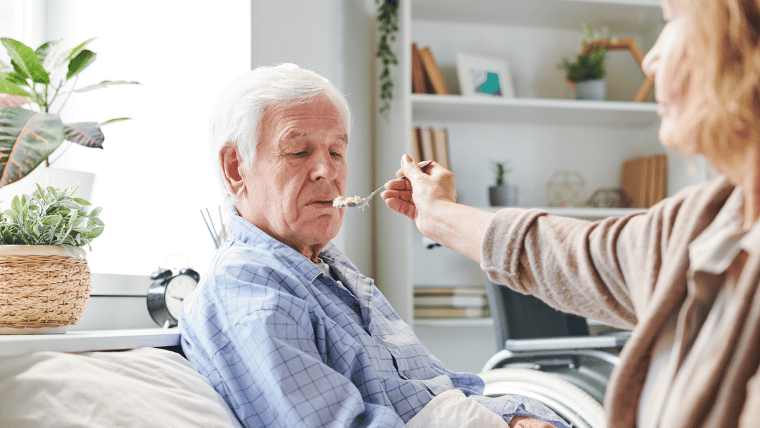Palliative care at home is available to individuals in Melbourne who are living with serious or life-limiting conditions. This care takes place in the comfort of your own home and includes specialised treatment and support. According to Palliative Care Australia – the peak Australian body:
“Palliative care is person and family-centred care provided for a person with an active, progressive, advanced disease, who has little or no prospect of cure and who is expected to die, and for whom the primary goal is to optimise the quality of life.”
Palliative Care Australia
We optimise our patient’s quality of life by identifying their physical, emotional, spiritual, and social needs. We then create a comprehensive care plan tailored to them.
The World Health Organisation (WHO) describes palliative care as an approach that:
“improves the quality of life of patients and their families facing the problems associated with life-threatening illness, through the prevention and relief of suffering by means of early identification and impeccable assessment and treatment of pain and other problems, physical, psychosocial and spiritual”.
World Health Organisation
Palliative care in Australia:
- relieves pain and other distressing symptoms
- advocates for investigations that are necessary to better understand and manage clinical complications
- regards dying as a normal biological process
- intends neither to hasten or postpone death
- integrates the psychological and spiritual into the patient’s care
- promotes patients living as independently and actively as possible until death
- can be used in conjunction with other therapies which aim to prolong life, such as radiation therapy
- provides the family guidance and support in bereavement
We strongly believe palliative care at home in Australia should be the first option considered. Staying in one’s home can benefit a person’s wellbeing at the end of life. It creates a sense of knowing, security, and comfort. Memories are also associated with the home, providing comfort and security.

According to ‘Dying Well‘ by the Grattan Institute:
“People want to die comfortably at home, supported by family and friends and effective services. But dying in Australia is more institutionalised than in the rest of the world. Community and medical attitudes plus a lack of funds for formal community care mean that about half of Australians die in hospital, and about a third in residential care. Often they have impersonal, lingering and lonely deaths; many feel disempowered. Seventy per cent of people want to die at home, yet only about 14 per cent do so. “
The situation whereby those wanting to die at home, ending up in residential homecare settings, stems from a lack of palliative care planning. Many individuals simply do not know they can live out their lives at home. Palliative care planning must promote awareness and education of in-home options.
What does dying at home look like?
Palliative care in the home offers our clients in Melbourne and Victoria, gold standard care in areas such as:
- In the course of optimising your life our goal is to manage pain and alleviate any distressing symptoms. This may involve the use of medication, physical therapies, counselling and other evidence-based interventions tailored to your needs.
- We recognise the emotional and psychological issues experienced by patients and their families. As providers we offer emotional and psychosocial support. Our team are trained in counselling, emotional support, and guidance. This helps our patients and their families cope with stress, grief, and anxiety associated with serious life-limiting illness.
- Our palliative nursing team is dedicated to care coordination. We will work closely with your primary healthcare team and other providers. We want to ensure a smooth and connected care experience for you. We can help coordinate medical appointments and facilitate communication between healthcare professionals.
- We can provide assistance with daily activities. This includes practical support with personal hygiene, mobility assistance, and meal preparation. This assistance aims to enhance our patient’s comfort and independence while relieving some of the burdens on family caregivers.
- We can offer spiritual and cultural support to our patients. If desired, we can help them connect with religious or spiritual resources.
- Our palliative care Melbourne team is sensitive and able to provide education and guidance to patients and their families. This guidance covers the nature of the illness, treatment options, and end-of-life decision-making. We guide patients and their families through the complexities of the healthcare process. This helps them make informed decisions about end of life care. We can assist with Advance Care Planning via and Advanced Care Directive (ACD) stating end of life preferences
- Palliative care services are available 24/7. This allows our patients and their families to access support and advice whenever it is required. This availability helps manage crises, provide reassurance, and address urgent concerns promptly.
- Respite for family members who become exhausted when caring for a loved one in palliative care at home. Our team can provide respite for those times when immediate family members need a break.
The 5 stages of palliative care at home
The journey of a patient’s palliative care follows through 5 stages including:
1 – Stable:
The patient’s needs are assessed to determine the necessary level of care required. Exiting problems and symptoms are adequately controlled. The care plan will detail the services needed and how they may change as the patient’s illness progresses.
The focus at this stage is for the patient to remain as independent as possible. The family and carer situation is also relatively stable, and no new issues are apparent .
2 – Unstable
The patient’s existing problems rapidly increase in severity. The specialist palliative care Melbourne team will urgently adjust services to keep the patient as comfortable as possible. New problems develop that weren’t expected.
Family and carer circumstances change that suddenly impact on patient care. The palliative care teams provide emotional and psychological support to patients and their families. This is a key focus as they help prepare for the upcoming stages.
3 – Decline/Deterioration
Focus shifts to end of life care as the patient’s condition progresses. Their overall functional status is declining. There is a gradual worsening of existing problems and an increase in expected new problems.
Family and carers experience gradual worsening distress which impacts patient care. A key focus becomes the provision of psychosocial, emotional, and spiritual care. As a result this care helps manage the emotions of everyone during this unprecedented time. Additionally, the palliative care team may provide advance care planning.
4 – Terminal
The primary goal is to ensure the patient remains as comfortable as possible. The primary goal of care is to ensure comfort. This includes physical, psychological and spiritual comfort. We also provide end of life medications as needed.
5 – Bereavement
In the final stage, the patient has passed away. The focus of care shifts to the family left behind and the planned provision of support.
The palliative care team Melbourne provides relief from symptoms and stress of the situation. They do this by supporting the physical, emotional, social, and spiritual needs of patients, family, and carers. Preparing for each stage before it arrives can help patients and their families cope better during difficult times. It is important to be prepared in advance.

How palliative care at home works
Teamwork is essential to providing quality palliative care. Your in-home team liaise with doctors, specialists, and other healthcare professionals. They work together to improve existing systems and processes. This ensures a seamless care experience.
Your needs determine the level of care. As no two situations or individuals are alike, care should be tailored accordingly. We assess your needs carefully. Then, we match these needs with the services we offer. Finally, we provide these services with the primary goal of optimising your life.
It’s not about your illness. Palliative care is not about treating your illness, but rather about providing pain management, comfort and support to you, the patient. It is patient-centred and patient-driven.
We go above and beyond. In-home palliative care nursing is also about companionship and emotional support, assistance with activities, and help around the home. Our palliative care Victoria teams offer support to families. This helps them to accept and adapt to their new circumstances, while still maintaining some of their usual routines and activities.
Replace everything that’s stressful about a hospital with the comforts of home. Visiting loved ones in hospital is stressful. Palliative care at home, rather than in hospital has many benefits. It eliminates the need to find a carpark, prevents young children from disrupting other patients, and removes rigid visiting hours. Additionally, it focuses on the patient, rather than the illness.
What does it cost to die at home?
Australia’s public health system offer palliative care services without charge. These services can be provided at home, at a residential aged care facility, or in a hospital as an inpatient. The federal, state and territory governments fund a range of palliative care services in Victoria.
You do not have to be getting aged care services to access palliative care services. Doctors, aged care providers, state or territory health departments and community health services can help you access palliative care in Victoria.
Sometimes you may have to pay for hiring of specialised equipment or for certain therapies not offered by your provider.
Palliative Care Australia are calling for major reforms and additional funding. Their goal is to significantly boost access to palliative services in the home and community. Investment into palliative care in Australia will help address the increasing demand for these services and help more people die at home.
This is a broad area of need. The Australian government needs to invest more in general practice and primary care. They must also provide increased personal care support, respite, and home and community care packages.
Benefits of palliative services at home
The benefits of palliative services at home are numerous. Palliative care Victoria can be provided by various healthcare and community services. This type of care is not limited to particular conditions and can be given at any stage of illness, and can be provided alongside curative treatments. It keeps patients out of the hospital and residential aged care system. It supports family and friends to be involved in their loved one’s caregiving.
An additional benefit of palliative care at home is that it can be tailored exclusively to our patient’s needs and preferences. There is no cookie cutter approach to palliative care at home because it is solely driven by our patient’s diverse and individual wants and needs. It promotes dignity, respect, and a sense of control during what is an enormously challenging time.
There’s really no place like home. Colbrow provides experienced and compassionate palliative care services. We have enabled hundreds of people to remain in the comfort of their own home during their final days. Dying is a human experience, not just a medical one. Whatever circumstances surround your life-limiting disease or illness, the right support is available.
You may still have many more questions about palliative care in Victoria.
If you do call Colbrow Care today on 1300 33 11 03










